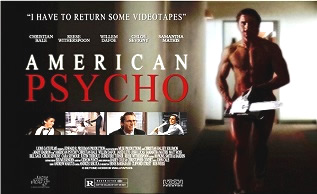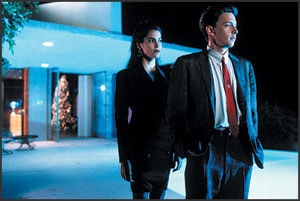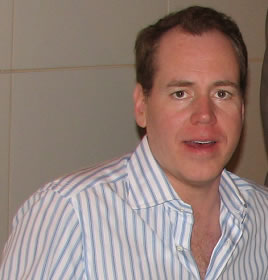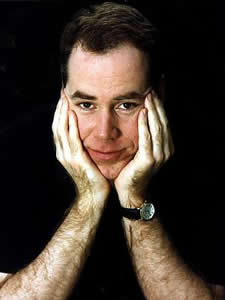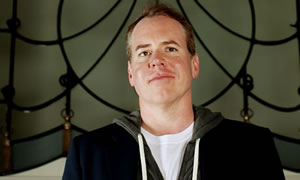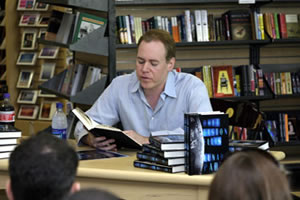De Amerikaanse schrijver Bret Easton Ellis werd geboren op 7 maart 1964 in Los Angeles. Zie ook alle tags voor Bret Easton Ellis op dit blog.
Uit: The Rules of Attraction
“FALL, 1985 and it’s a story that might bore you but you don’t have to listen, she told me, because she always knew it was going to be like that, and it was, she thinks, her first year, or, actually weekend, really a Friday, in September, at Camden, and this was three or four years ago, and she got so drunk that she ended up in bed, lost her virginity (late, she was eighteen) in Lorna Slavin’s room, because she was a Freshman and had a roommate and Lorna was, she remembers, a Senior or a Junior and usually sometimes at her boyfriend’s place off-campus, to who she thought was a Sophomore Ceramics major but who was actually either some guy from N.Y.U., a film student, and up in New Hampshire just for The Dressed To Get Screwed party, or a townie. She actually had her eye on someone else that night: Daniel Miller, a Senior, a Drama major, only a little gay, with blond hair, a great body and these amazing gray eyes, but he was seeing this beautiful French girl from Ohio, and he eventually got mono and went to Europe and never finished his Senior year. So this guy (she doesn’t even remember his name now – Rudolph? Bobo?) from N.Y.U. and her were talking under, she remembers this, a big poster of Reagan that someone had drawn a moustache and sunglasses on, and he was talking about all these movies, and she kept telling him that she’d seen all these movies even though she hadn’t, and she kept agreeing with him, with his likes, with his dislikes, all the time thinking that he might not be a Daniel Miller (this guy had spiky blueblack hair, paisley tie, and, unfortunately, the beginnings of a goatee) but was still cute enough, and she was sure she was mispronouncing all these filmmakers’ names, remembering the wrong actors, naming the wrong cinematographers, but she wanted him and she could see that he was looking over at Kathy Kotcheff, and she was looking back at him and she was getting incredibly smashed and kept nodding and he went over to the keg to get them some more beer and Kathy Kotcheff, who was wearing a black bra and black panties complete with garter belt, started talking to him and she was getting desperate. She was going to go over and drop some names, mention Salle or Longo, but felt it would be too pretentious, so she walked up behind him and simply whispered that she had some pot in her room, even though she didn’t but hoped that Lorna did and so he smiled and said that seemed like a good idea. On the way up the stairs she bummed a cigarette that she was never going to smoke from someone and they went to Lorna’s room. He closed the door and locked it. She turned the light on.”

Bret Easton Ellis (Los Angeles, 7 maart 1964)
De Britse schrijver en journalist Robert Dennis Harris werd geboren op 7 maart 1957 in Nottingham. Zie ook alle tags voor Robert Harris op dit blog.
Uit: Conclaaf (Vertaald door Reintje Ghoos en Jan Pieter van der Sterre)
“In het gastenverblijf hing een sobere, antiseptische sfeer, als in een privékliniek. Meer dan tien priesters stonden verspreid in de witmarmeren hal, van wie er drie in kamerjas waren. Ze hadden een verbijsterde blik in de ogen, alsof er brandalarm had geklonken en ze niet precies wisten wat de regels waren om daarop te reageren. Lomeli aarzelde toen hij op de drempel stond, voelde iets in zijn linkerhand en zag dat hij zijn rode kalotje omklemde. Hij kon zich niet herinneren dat te hebben meegepakt. Hij vouwde het open en legde het op zijn hoofd. Zijn haar voelde enigszins vochtig.
Een Afrikaanse bisschop probeerde hem op weg naar de lift staande te houden, maar Lomeli knikte hem enkel toe en liep door. Het duurde eindeloos voordat de lift verscheen. Hij had de trap moeten nemen. Maar hij was te veel buiten adem. Hij voelde de blikken van de anderen in zijn rug. Hij zou iets moeten zeggen. Daar was de lift. De deuren schoven open. Hij keerde zich om en stak een zegenende hand omhoog. ‘Bidden,’ zei hij.
Hij drukte op de knop voor de tweede verdieping; de deuren gingen dicht en hij begon omhoog te gaan. Als het Uw wil is om hem bij U te roepen en mij achter te laten, geef me dan ten minste de kracht om een toeverlaat voor anderen te zijn.
In de spiegel zag zijn ingevallen gezicht onder het gele licht er grauw en vlekkerig uit. Hij snakte naar een teken, naar een ingeving die kracht gaf. De lift kwam met een ruk tot stilstand, maar zijn maag leek te blijven stijgen; hij moest de metalen leuning vastgrijpen om zijn evenwicht te hervinden. Hij herinnerde zich hoe hij in de begintijd van het pausdom van de Heilige Vader precies in diezelfde lift had gestaan en dat er twee al wat oudere monseigneurs instapten. Overweldigd door de lijfelijke aanwezigheid van Christus’ vertegenwoordiger op aarde vielen ze meteen op hun knieën, waarop de paus in de lach schoot en zei: ‘Maakt u zich geen zorgen, sta op, ik ben gewoon een oude zondaar, niet beter dan u beiden…”
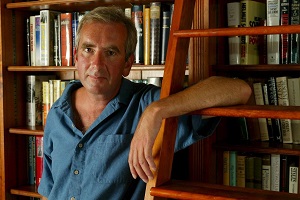
Robert Harris (Nottingham, 7 maart 1957)
De Duitse dichter en schrijver Jürgen Theobaldy werd geboren op 7 maart 1944 in Straatsburg. Zie ook alle tags voor Jürgen Theobaldy op dit blog
Uit: Aus nächster Nähe
„Der Himmel hing tief, seit Tagen schon, die Wolkendecke war grau, verwischtes Marmor kurz vor Silvester, und bevor es richtig hell werden konnte, dämmerte es von neuem. Kachelofenniederschlag, ein nordisch fahles Nachleuchten, unter dem Richard diesmal einfach mitgetrottet war, ins Kaufhaus der vier Winde, so nannte Gunter das KaDeWe seit den Breschen in der Mauer. Ganz oben, zwischen den Delikatessen, musste man, wie Gunter ihn einführte, die volle Tüte im Auge behalten, wenn man seinen Fischzug mit einem Prosecco an der Bar beschloss, und Richard stand daneben, als Gunter das Angebot in den Regalen musterte, wählerisch, als hätte er sonst selten die Wahl, auf seiner Suche nach Beigaben für einen safranbeseelten Risotto. An solchen Tagen, an denen Richard, höchstens neugierig auf das Staunen der Ankömmlinge vor den luxuriösen Glanzlichtern im Westen, sich derart treiben ließ, traf er meistens auf ein Gesicht aus früheren Versammlungen und vollgequalmten, inzwischen verödeten Kneipen: Zufälle, die ihm als unvermeidliche fast berechenbar schienen.
Deshalb hielt Richard eine persönliche Statistik für möglich, nur fehlte ihm der Abstand, sie einzusehen, und er wollte keine statistische Größe sein. Das gab er an der Bar weiter, als er dort auf Plettner stieß, den Pletti, seit gut zehn Jahren nicht mehr gesehen, den nachlässigen Volkswirtschaftler damals im Studentenheim, draußen neben den Mais- und Rübenfeldern am Rand von Heidelberg, wohin Richard so oft gefahren war. Das Zimmer von Mona war auf demselben Stockwerk wie Plettners Zimmer gelegen, und ein paar Semester später war Pletti, heute rotbäckiger Enddreißiger mit börsennotierten Interessen, wie Richard schien, früher jedoch an revolutionären Umtrieben interessiert, allzu oft bei Mona in der Wohngemeinschaft aufgetaucht; ja er war ihr sogar ein enger Vertrauter geworden, vorsichtig gesagt, und eigentlich freute sich Richard, dass er wenigstens ihn wieder vor sich sah. Die Hand halb verlegen, halb gönnerhaft ihm auf der Schulter, fühlte Richard sich selbst, zu Recht, wie ihm sofort überlief, gönnerhaft behandelt, doch er musste nach Mona fragen, ganz egal, was Plettner dazu durch den Kopf ginge. »Die Mona«, wiederholte Plettner, »die soll ja lange in Säo Paulo gewesen sein und dort im Labor gearbeitet haben.« »Also hal- sie ihrenlAbschluss nicht umsonst gemacht.”
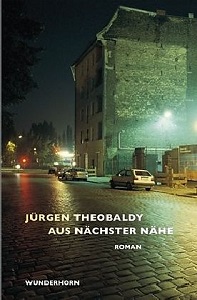
Jürgen Theobaldy (Straatsburg, 7 maart 1944)
Cover
De Franse schrijver Georges Perec werd geboren op 7 maart 1936 in Parijs. Zie ook alle tags voor Georges Perec op dit blog.
Uit: Les choses
« Pouvez-vous me décrire un homme qui aime les pâtes? Que pensez-vous de votre machine à laver? Est-ce que vous en êtes satisfaite? Est-ce qu’elle ne mousse pas trop? Est-ce qu’elle lave bien? Est-ce qu’elle déchire le linge? Est-ce qu’elle sèche le linge? Est-ce que vous préféreriez une machine à laver qui sécherait votre linge aussi? Et la sécurité à la mine, est-elle bien faite, ou pas assez selon vous? (Faire parler le sujet: demandez-lui de raconter des exemples personnels; des choses qu’il a vues; est-ce qu’il a déjà été blessé lui-même? comment ça s’est passé? Et son fils, est-ce qu’il sera mineur comme son père, ou bien quoi?)
Il y eut la lessive, le linge qui sèche, le repassage. Le gaz, l’électricité, le téléphone. Les enfants. Les vêtements et les sous-vêtements. La moutarde. Les soupes en sachets, les soupes en boîtes. Les cheveux: comment les laver, comment les teindre, comment les faire tenir, comment les faire briller. Les étudiants, les ongles, les sirops pour la toux, les machines à écrire, les engrais, les tracteurs, les loisirs, les cadeaux, la papeterie, le blanc, la politique, les autoroutes, les boissons alcoolisées, les eaux minérales, les fromages et les conserves, les lampes et les rideaux, les assurances, le jardinage.
Rien de ce qui était humain ne leur fut étranger.
Pour la première fois, ils gagnèrent quelque argent. Leur travail ne leur plaisait pas: aurait-il pu leur plaire? Il ne les ennuyait pas trop non plus. Ils avaient l’impression de beaucoup y apprendre. D’année en année, il les transforma.
Ce furent les grandes heures de leur conquête. Ils n’avaient rien; ils découvraient les richesses du monde.
Ils avaient longtemps été parfaitement anonymes. Ils étaient vêtus comme des étudiants, c’est-à-dire mal. Sylvie d’une unique jupe, de chandails laids, d’un pantalon de velours, d’un duffle-coat, Jérôme d’une canadienne crasseuse, d’un complet de confection, d’une cravate lamentable. Ils se plongèrent avec ravissement dans la mode anglaise. Ils découvrirent les lainages, les chemisiers de soie, les chemises de Doucet, les cravates en voile, les carrés de soie, le tweed, le lambswool, le cashmere, le vicuna, le cuir et le jersey, le lin, la magistrale hiérarchie des chaussures, enfin, qui mène des Churchs aux Weston, des Weston aux Bunting, et des Bunting aux Lobb.”
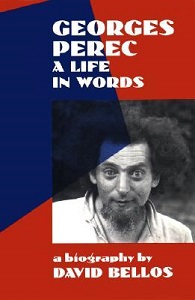
Georges Perec (7 maart 1936 – 3 maart 1982)
Cover biografie
De Japanse schrijver Abe Kōbō werd geboren op 7 maart 1924 in Tokyo. Zie ook alle tags voor Abe Kōbō op dit blog.
Uit: The Ark Sakura
“Once a month I go shopping downtown, near the prefectural offices. It takes me the better part of an hour to drive there, but since my purchases include a lot of specialized items–faucet packing, spare blades for power tools, large laminated dry cells, that sort of thing–the local shops won’t do. Besides, I’d rather not run into anyone I know. My nickname trails after me like a shadow.
My nickname is Pig–or Mole. I stand five feet eight inches tall, weigh two hundred fifteen pounds, and have round shoulders and stumpy arms and legs. Once, hoping to make myself more inconspicuous, I took to wearing a long black raincoat–but any hope I might have had was swept away when I walked by the new city hall complex on the broad avenue leading up to the station. The city hall building is a black steel frame covered with black glass, like a great black mirror; you have to pass it to get to the train station. With that raincoat on, I looked like a whale calf that had lost its way, or a discarded football, blackened from lying in the trash. Although the distorted reflection of my surroundings was amusing, my own twisted image seemed merely pitiful. Besides, in hot weather the crease in my double chin perspires so much that I break out in a rash; I can’t very well cool the underside of my chin against a stone wall the way I can my forehead or the soles of my feet. I even have trouble sleeping. A raincoat is simply out of the question. My reclusion deepens.
If I must have a nickname, let it be Mole, not Pig. Mole is not only the less unappealing of the two but also more fitting: for the last three years or so I’ve been living underground. Not in a cylindrical cave like a mole’s burrow but in a former quarry for architectural stone, with vertical walls and level ceilings and floors. The place is a vast underground complex where thousands of people could live, with over seventy stone rooms piled up every which way, all interconnected by stone stairways and tunnels. In size the rooms range from great halls like indoor stadiums to tiny cubbyholes where they used to take test samples. Of course there are no amenities like piped water or drainage, or power lines. No shops, no police station, no post office. The sole inhabitant is me. And so Mole will do for a name, at least until something better suggests itself.”

Abe Kōbō (7 maart 1924 – 22 januari 1993)
Cover
De Duitse schrijver Reinhard Kaiser werd geboren op 7 maart 1950 in Viersen. Zie ook alle tags voor Reinhard Kaiser op dit blog.
Uit: Der glückliche Kunsträuber. Das Leben des Vivant Denon
“Historische Achse — Seit es sie gibt, scheint die gläserne Pyramide des Louvre in Paris den Ausgangspunkt einer Geraden zu bilden, die wie mit dem Lineal gezogen in westlicher Richtung durch die französische Hauptstadt verläuft. Zunächst passiert diese Gerade einen Triumphbogen römischen Formats, schneidet dann – auf der Place de la Concorde – einen echten, altägyptischen Obelisken und unterquert noch einen zweiten Triumphbogen, diesmal von napoleonischen Ausmaßen, bevor sie sich hinter der so gut wie quadratischen Öffnung einer Baulichkeit im Weiten verliert, die seltsamerweise ebenfalls «Bogen» – sogar «Großer Bogen», Grande Arche – genannt wird und allein zu dem phantastischen Zweck errichtet scheint, ein Stück Himmel einzurahmen und gleichsam an die Erde zu heften. Genau genommen beginnt diese «historische Achse», wie sie in Frankreich genannt wird, allerdings nicht bei der gläsernen Pyramide, sondern bei einem schräg vor ihr stehenden Reiterstandbild Ludwigs XIV. Die Pyramide und der ganze Louvre liegen nämlich ein wenig versetzt zu ihr. Trotzdem ergibt sich der Eindruck, dass zwischen all diesen Denk- und Sehenswürdigkeiten, über Räume und Zeiten hinweg, ein Zusammenhang besteht, und dieser Eindruck täuscht nicht. Auch die gläserne Pyramide dient einem phantastischen Zweck. Sie markiert und beschirmt einen Zugang zur Kunst, wie es keinen zweiten auf der Welt gibt. Sie eröffnet den Weg in eine Sammlung von Sammlungen, die nicht ihresgleichen hat. Wenn der Besucher in die Pyramide getreten ist, bleibt ihm nach der Sicherheitskontrolle nichts anderes übrig, als erst einmal hinabzusteigen auf eine tiefer gelegene, dank des durchsichtigen Zeltes über ihm aber dennoch lichte Ebene. Dort unten hat er
dann die Wahl. Drei Wege führen von hier zur Kunst. Entscheidet er sich für den, der nach rechts, nach Süden, in Richtung der Seine, zum ältesten Teil des Museums abzweigt, so gleitet er nach einigen Schritten auf einer nun wieder in die Höhe führenden Rolltreppe den Buchstaben D-E-N-O-N entgegen und kann dann, unter ihnen hindurchgehend, seinen Weg fortsetzen – zu den römischen und griechischen Antiken im Erdgeschoss oder hinauf nach der Beletage, zu den italienischen Meistern in der Grande Galerie, zur Mona Lisa und zu den großformatigen Franzosen des 19. Jahrhunderts in den angrenzenden Sälen.
Der Louvre hat in den zweieinhalb Jahrzehnten seit der Eröffnung der Pyramide und mit all den Erweiterungen, die ihr folgten, einen Glanz erlangt, der ungeheuerlich und unvergleichlich erscheint. Doch dieser Eindruck täuscht. So viel Strahlkraft, wie er heute hat, ist schon einmal von ihm ausgegangen – kurz nachdem das einstige Königsschloss zu Beginn der revolutionären Schreckensherrschaft, im Sommer 1793, in ein Kunstmuseum umgewandelt worden war. Während der ersten beiden Jahrzehnte seines Daseins stand dieser Louvre in seiner Pracht und seiner Anziehungskraft hinter dem von heute nicht zurück, und was die – nach dem Urteil der Zeitgenossen – großartigen Gemälde und Skulpturen allerhöchsten Ranges anging, die er damals beherbergte, so übertraf ihre Zahl und ihre Qualität sogar die Bestände des heutigen Museums. Nachher allerdings ging es dann sehr plötzlich und steil bergab.“

Reinhard Kaiser (Viersen, 7 maart 1950)
Cover
De Duitse schrijver Manfred Gregor (pseudoniem van Gregor Dorfmeister) werd geboren op 7 maart 1929 in Tailfingen. Zie ook alle tags voor Manfred Gregor op dit blog.
Uit: Die Brücke
„Jahrgang 1905. Vorname Alois, Alois Schaubeck also. Berufssoldat. Spezialist im Umgang mit Menschen und Material, Weibern und Alkohol. Legt keinen Wert auf Qualität, weder bei den Weibern noch beim Alkohol. Hauptsache viel und möglichst noch mehr. Schönste Zeit: Nachturlaub. Wie war das doch damals mit Schaubeck? Wie war das doch? Ach ja, Schaubeck hatte geheiratet. Ganz schnell. Vier oder fünf Tage hatte er Kitty gekannt: »Aber Mensch, Kitty, Kitty ist ja ’n süßer Name, aber du kannst doch nicht Kitty heißen, sagen wir Käthi, klar?« Kriegstrauung. Das dauerte vier Wochen. Dann kam Schaubeck nicht mehr nach Hause. Oder nur noch selten. Kitty ging wieder ihrer Arbeit nach und Schaubeck dem Alkohol und den Weibern. Und wenn er mit einem Kumpel in die Orlandobar kam und von seinem Tisch aus hin und wieder einen Blick zur Kitty hinter der Messingtheke sandte, konnte es nach der zweiten, dritten Flasche Wein passieren, dass Schaubeck sagte: »Siehst du die Rote hinter der Bar? Das ist die Kitty, musst du wissen. War mal meine Frau, ’ne feine Sache, musst du wissen. Tolle Feste gefeiert, hahahaha!« Und dann konnte Schaubeck lachen. Kollernd und polternd. Und dann konnte er trinken. Und wenn er genug getrunken hatte, zeigte er, dass er auch Einblick in die höhere Literatur gewonnen hatte: »Kennste den … Frau Wirtin hatte …? Hahahaha, hahaha!«
Aber das ist nicht alles über Alois Schaubeck. Die Darstellung wäre unvollständig, würde man nicht erwähnen, dass er seinen Haufen in mustergültiger Ordnung hatte. Dass ihn seine Vorgesetzten nicht schätzten, aber die Erfolge seiner Ausbildung anerkannten. Dass kein Mann sich so schnell exakt in den Dreck schmeißen konnte wie einer, der durch Schaubecks Schule gegangen war. Schaubeck verbrachte den Krieg in der Heimat. Manchmal prahlte er mit einer Verwundung, aber hin und wieder hatte er das Pech, dass einer zuhörte, der es besser wusste. Dann hieß es: »Halt bloß die Luft an, Schaubeck, sonst wirst du gleich noch mal verwundet!« Schaubecks Verwundung stammte von einem Verkehrsunfall. Aber das wusste Ernst Scholten nicht.“
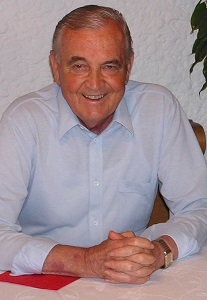
Manfred Gregor (Tailfingen, 7 maart 1929)
De Nederlandse dichter en schrijver Jan Frederik Helmers werd geboren op 7 maart 1767 in Amsterdam. Zie ook alle tags voor Jan Frederik Helmers op dit blog.
De Dichter (Fragment)
Neen, tot geen dier, geen plantenleven,
Is *t menschdom door natuur bestemd.
Hij zal zijn woesten staat ontzweven:
Door ’t heilig juk der wet word ras zijn drift getemd.
Maar wie, wie zal de schors verbreeken,
Die hem omsluit? de toorts ontsteken
Van *t licht, waarmeê hij is begaafd?
Wie is die halvegod, en eerste volksverlichter?
Wie vaagt de nevlen weg? het is alleen de Dichter,
Die *t woeste menschdom *t eerst beschaaft.
Dring de eeuwen door! Zie Orfeus nadert.
’t Verbasterd menschdom hoort zijn taal;
’t Ligt luistrend aan zijn’ voet vergaderd,
En voelt, ó Wonder! thans zich zelv’ voor de eerstemaal.
Barbaarsheid vlucht! en zagte zeden
En kunsten, en bevalligheden
Doorzweven ’t nieuw geschapen land.
De steden rijzen op, en Ceres kroont de velden,
Terwijl met lieve lach de maagdenreien melden
Loo De wond’ren van des dichters hand.
Verwijderd van het stadgewemel,
Bij ’t plegtig duister van den nacht,
Gedekt door d’eeuwgen starrenhemel,
Verheft een dichter zich met ongekende kragt.
Aan ’t strand der zee, zich zelv’ verliezend’
Daar op een rots zijn standplaats kiezend’.
Ziet hij de schepping uitgebreid.
Zijn geest ontwringt zich de aard’, van heilige aandrift zwanger,
Vat hij de lier, elk hoort na de opgetogen zanger,
En hij zingt voor de onsterflijkheid.
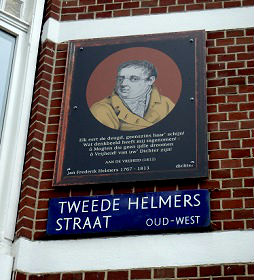
Jan Frederik Helmers (7 maart 1767 – 26 februari 1813)
Gedenkplaat in Amsterdam aan het begin van de Tweede Helmersstraat
De Italiaanse dichter en schrijver Alessandro Francesco Tommaso Manzoni werd geboren op 7 maart 1785 in Milaan.Zie ook alle tags voor Alessandro Manzoni op dit blog.
The fifth of May (Fragment)
He made a name, two centuries, set
Armed against each other and
To him turned as for their fate,
Waited a signal of his hand.
He sat between them, hushed them still,
Made arbiter his iron will;
And disappeared; his empty days
Mured within that narrow bound,
Mark for envy’s fiercest rays,
Pity’s sympathy profound,
Inextinguishable hate,
And love unsubdued by fate.
As on the shipwrecked sailor’s head
The wave is wrapped and weighs him down,
The wave upon whose lofty spread
His strained sight was lately thrown,
Scanning to discern once more
The distant and evading shore;
Such on that soul the massy weight
Of memories descended, when —
How many times! — he would narrate
What he has been to coming men;
And on the eternal page remained
Fallen the palsied, nerveless hand!
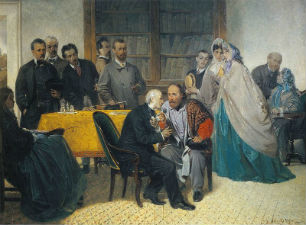
Alessandro Manzoni (7 maart 1785 – 22 mei 1873)
Giuseppe Garabaldi bezoekt Alessandro Manzoni op 15 maart 1862 – door Sebastiano de Albertis, 1863
Zie voor nog meer schrijvers van de 7e maart ook mijn blog van 7 maart 2016 en ook mijn blog van 7 maart 2015 deel 2.


